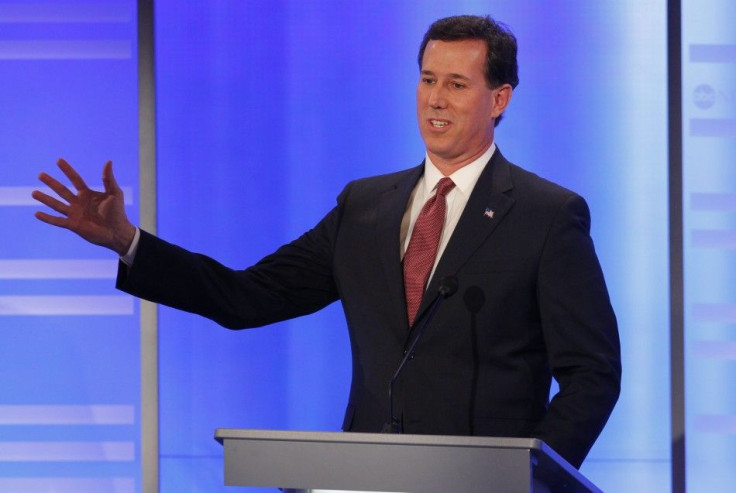Carolina in Their Minds, Republican Candidates Stress Social Stances in Debate

Most of the Republican presidential candidates laid out their credentials as social conservatives in a debate on Saturday as the 2012 campaign prepares to move from moderate New Hampshire to church-going South Carolina.
Abortion rights and same-sex marriage were among the issues that came up in the ABC News debate at Saint Anselm College in Manchester, N.H.
Former U.S. Sen. Rick Santorum of Pennsylvania led the charge at the ABC News debate, declaring that marriage is a federal issue that should be defined as being between a man and a woman -- even though he said in the same breath that the question about same-sex couples should be allowed to adopt children was a states' rights issue.
The 100-minute debate was heavy on economic issues, military matters, and trade policy, but took a detour into the culture wars when front-runner Mitt Romney was asked about whether states should have the ability to ban access to contraception -- an apparent attempt to engage Romney and Santorum.
After a lengthy back-and-forth with the moderator, the former Massachusetts governor concluded, to applause, that no state wants to do [it], and asking me whether they could do it or not is kind of a silly thing, I think.
In New Hampshire, the second state to vote in the 2012 Republican nominating contest, voters traditionally focus less on social issues and more on low taxes and the economy.
Santorum, who gained momentum with his strong finish in socially conservative Iowa last week, has had several testy exchanges with New Hampshire voters over his hardline stance opposing gay marriage.
Romney has focused his campaign almost solely on the issues of jobs and the economy, but has come under fire at times from social conservatives for his past support of gay rights and legalized abortion.
He has since changed positions, and on Saturday declared that he thinks marriage should be defined as between a man and a woman and that he wants the U.S. Supreme Court to overturn Roe v. Wade, the landmark 1973 decision that legalized abortion.
Santorum and others in the Republican field looking to slow Romney's momentum coming out of New Hampshire may look to South Carolina's voters for a helping hand.
Concentration of Social Conservatives
South Carolina, with its primary to be conducted Jan. 21, has a heavy concentration of social conservatives who are thought to be more willing than most to assess a candidate based on his or her views on abortion or gay marriage.
As in Iowa, where Santorum's campaign sprang to life, about 60 percent of Republican voters in South Carolina typically identify themselves in exit polls as born-again or evangelical Christians. Among that demographic in Iowa, Santorum finished first, with 32 percent support; Romney was at 14 percent, according to the Pew Forum on Religion and Republic Life.
Still, Eric Fehrnstrom, a senior Romney adviser, said that social issues will not play an outsize role in South Carolina's vote.
It doesn't matter if you're in Iowa, or New Hampshire, South Carolina or Florida or any other state in this union; the biggest issue is job creation and turning around the economy, Fehrnstrom said.
Santorum, long a favorite of Christian conservatives, has faced some stinging criticism for his views on gay rights issues in New Hampshire this week, including being booed at an event on Thursday after comparing gay marriage -- which is legal in the state -- to polygamy.
When Santorum was asked if he would move to dissolve gay marriages as president, or to outlaw adoption by gay couples, he said that if a constitutional amendment is passed to define marriage as being between a man and a woman, this issue becomes moot.
Republican candidates could be walking a thin line on gay rights as they attempt to shore up their conservative bona fides for the primary elections while trying not to alienate gay and lesbian voters before November's general election. In 2008, President Barack Obama won about 70 percent of the gay vote.
Romney said long-term relationships among homosexuals are a wonderful thing to do, but that doesn't mean they have to call it marriage.
Former Utah Gov. Jon Huntsman, who has staked his White House bid on a strong showing in New Hampshire, espoused a more moderate view, terming civil unions between gay couples fair.
(Additional reporting by Ros Krasny; editing by Mary Milliken and Christopher Wilson)
© Copyright Thomson Reuters 2024. All rights reserved.












